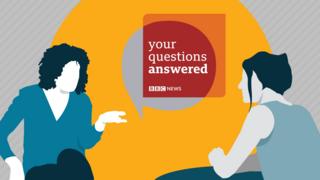
The government has announced new restrictions on people meeting up in England, which will come into force on Monday.
Here are some of your questions about how the new rules will work.
Questions and answers
New rules for England
Your questions
Skip New rules for EnglandHow will the new rules affect students living in university halls with their own en-suite lockable rooms but shared common rooms/kitchen areas? My daughter is moving in with seven others. from Cathy, Northumberland
New guidance published by the Department for Education on Thursday says that "households" should be identified in student accommodation.
It says: "A household in halls of residence is normally considered to be those students living in the same flat, or on the same floor, who share a kitchen and/or bathroom, rather than an entire block."
It adds that these can include more than six people, so your daughter and the other students she will live with will count as one household.
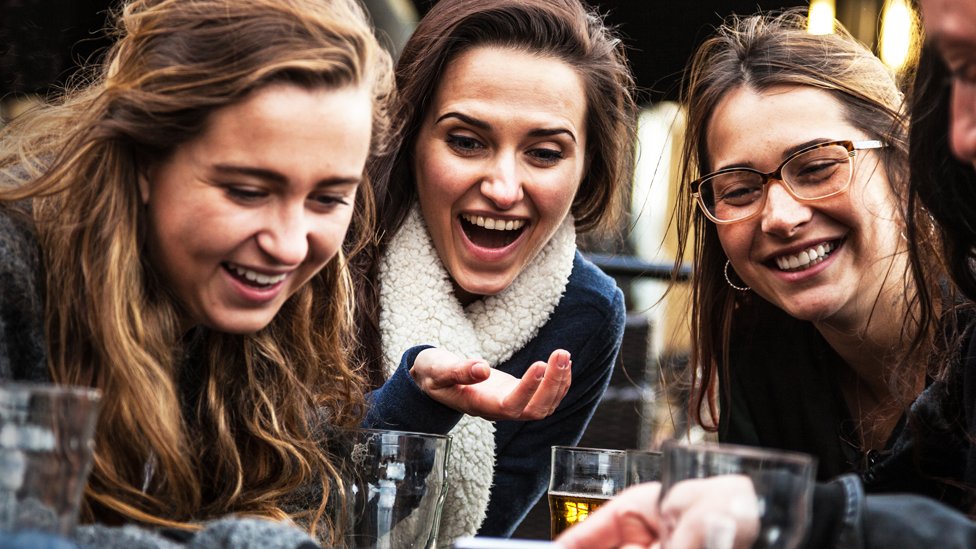
Will universities also be exempt from the new gatherings rule, as well as schools and workplaces? How will subjects such as art be taught? from Fiona Coulson in Wallingford
The new ban on meet-ups of more than six will not apply if the gathering is for work or education purposes. Workplaces and schools have been specifically listed as exemptions, and it seems likely that university seminars and lectures will also be exempt, as long as students do not sit together in groups of more than six.
But the guidance will apply to other aspects of university life, such as bars and social events held on campus.
Teaching this term was already designed to be socially distant wherever possible, with staff keeping at least one metre away from students, regardless of the subject being taught.

Is religious worship (without social gatherings afterwards) for more than six people still allowed from Monday? from Annie Williams in Haworth
While people will not be allowed to meet up in groups of more than six, indoor public venues are currently allowed to host more than one group at a time, provided that the groups are socially distanced. This includes places like pubs, restaurants and places of worship.
While more detail on the new rules will be set out shortly, the Archbishop of Canterbury Justin Welby tweeted: "After contact with Government we hear that there is no change to guidance on places of worship. Worship is the work of God - not a social gathering - and gives the strength to love and serve."
Why does the government have delayed start dates for precautions? Why not instantly? from Neil in Haworth
Official rules and guidance have been updated regularly during the pandemic and the government sometimes gives notice of changes days or weeks before they come into effect.
Decisions may be taken swiftly based on the latest scientific or health advice. The government then needs time to flesh out the details of how that change will work in practice, what the exceptions might be, and how it will be enforced.
It may also need to discuss changes with the other UK nations, and give government departments and any affected businesses and venues time to prepare and adjust to the new rules.
I have a child’s party organised for the 30 people we thought we were allowed. Can this still go ahead? It is in a village hall. from Vincent Scott in Thringstone
Unfortunately, the answer is probably not. The guidance until 14 September is that no more than two households should meet up indoors, although the police did not have powers to break up a group of 30 people or less.
Under the new rules, people are not supposed to meet up in groups bigger than six, bar specific exemptions such as schools and workplaces. Parties with more than six guests are not exempt, even if they were organised long before the rules changed.

I belong to a walking group. We have been walking with members up to 12 in a group. Will we now have to walk in groups of six? from Allan Martin, Rustington, West Sussex
Yes. Under the current guidelines, a maximum of six people from multiple households are supposed to meet outdoors anyway, although your walking groups may be made up of people who share a household.
From 14 September, people will not be able to congregate indoors or outdoors in groups of more than six, unless they are all from the same household. So you will need to walk in two separate groups.
We are six adults who were planning to go on holiday. If young children don't have to social distance, would a two-year-old be counted as the seventh or are we OK? from Lia Howell
Children are counted within the six-person limit, so if you are from different households then a group of seven people will breach the guidelines of how many people can meet or stay over in the same house.

We have a small bingo club (about 30 people) who meet in a hall with tables two metres apart and contact details of everyone. Can we still carry on with the new rules from Monday? from Stephen Tew, Northampton
If you are operating in a designated hospitality venue, such as a licensed bingo hall, then this would be allowed, provided people do not sit or congregate in groups of more than six. You must also keep records of everyone’s contact details for test and trace.
However, if you have hired a communal venue such as a village hall to put on your own bingo, then it is unlikely to be permitted.
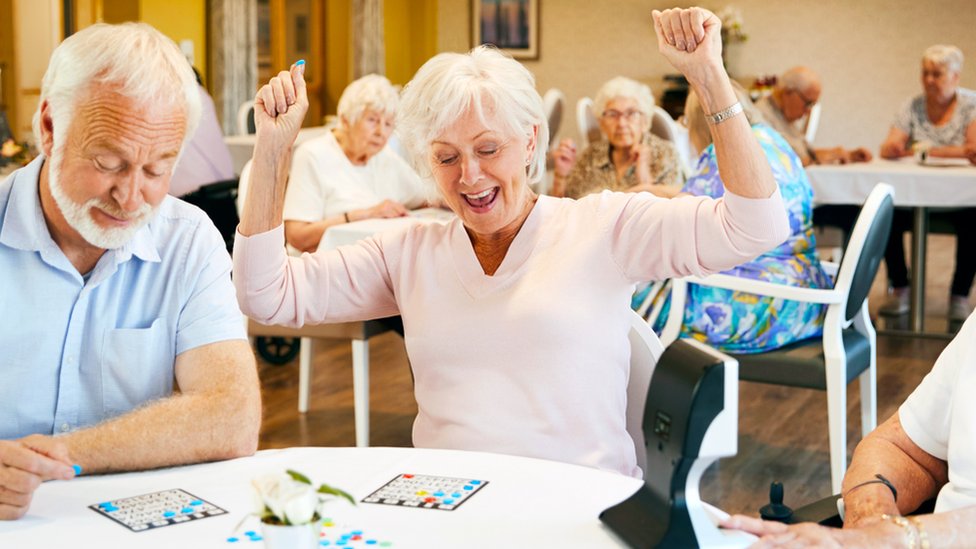
Do the new rules mean I can have five friends to my house making six of us. Or does it mean you only see family members? from Ingrid Morgan, Bushey
The new rules are about the number of people you can mix with, not whether they are family or friends.
At the moment, people from two households are allowed to meet indoors in England. But from Monday, that changes to a maximum of six people, but from multiple households, which actually gives you more freedom to see different people.
So your five friends will be able to visit you in your house from next week.
I am busy organsing a Christmas Market and have 30 stallholders who I will socially distance from one another. Can the market still go ahead? from Amanda Heppelthwaite, Berkshire
Shops and businesses are not being asked to close when the new rules come into force in England on Monday.
People will still be allowed to visit shops as they do now - just not in groups larger than six, which should mean that your market will be unaffected. It is worth being aware of {the updated guidance on contact tracing, which was published on Thursday.](https://www.gov.uk/government/news/venues-required-by-law-to-record-contact-details)

My exercise classes take place in a large hall and we are all distanced according to the measurements set out - will these classes now have to be stopped or limited to six people? from Susan Smith, Chatham
Health Secretary Matt Hancock has indicated that ‘’organised exercise’’ will be exempt from the new group size restrictions, provided it is ‘’covid-secure".
Under England's team sport guidelines, this means social distancing and regular hand washing should be practised.
Contact details of participants should be recorded for the purposes of track and trace and no group socialising take place before or after the activity. Equipment should be wiped down before and after use, and ideally not shared during the class.
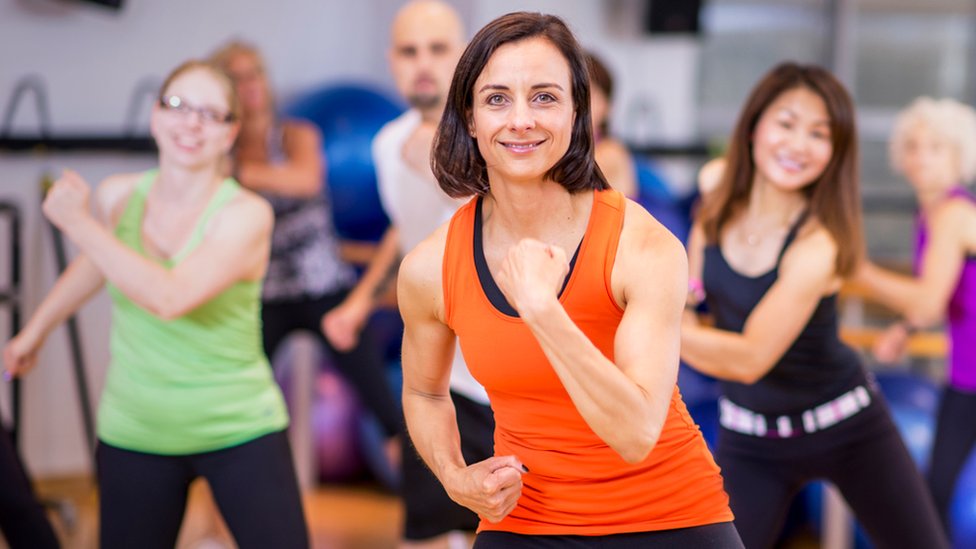
Question topics
Back to school
Your questions
Skip Back to schoolIs it a good idea to send kids back to school if they have a heart problem? from Zoe Corran in Bangor
People who have a serious heart condition are more vulnerable to coronavirus.
Many children with heart conditions will, until recently, have been shielding to protect themselves. Experts are now looking into whether as many children will need to shield in the future, given the reduced level of risk posed to children.
Across the UK, children who have been shielding are expected to return to school.
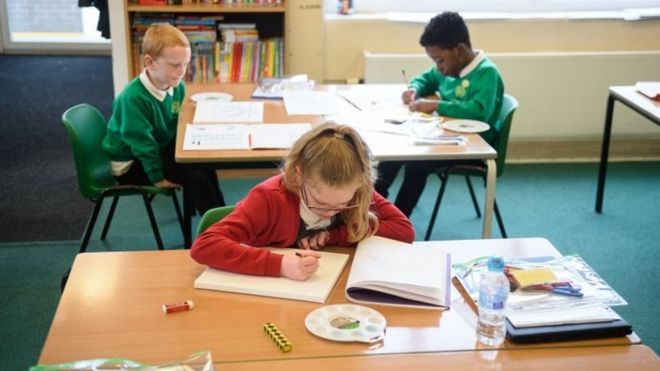
However, if a child has an extremely serious condition, your doctor can advice otherwise and parents should engage with the child’s school about the best way to continue their studies.
If there is an increase in cases in an area and a local lockdown is enforced, it is important to check what that means for children with health conditions who are allowed to return to school.
Return to school is mandatory from next week in England, but what happens for the children who are in quarantine due to travel to France? from Erica in Henley-on-Thames
Government guidance says that if you are arriving into the UK from a non-exempt country, you must self-isolsate for 14-days.
This means you cannot go to school, work or any public places (except in some very limited circumstances).
The government makes clear that parents should consider this when booking or going on holiday.
However, if you are quarantining it would be considered as following public health guidance and would therefore make it unlikely you would be fined for missing school.
I am a deaf teacher of the deaf, and I also have a deaf daughter, and I am extremely concerned about how the 50,000 deaf children in schools across the UK will be able to access education if masks are worn in schools, as they will be unable to lip read from Andrea
Secondary school pupils in Scotland, Northern Ireland and those areas of England in local lockdown will have to wear face coverings in communal areas from 31 August (1 September in England). Headteachers in any secondary school in England will also have the discretion to introduce them.
The widespread adoption of face coverings has been a cause of worry to deaf people. Ian Noon of the National Deaf Children’s Society has warned of loneliness and isolation being “a tragic result” of their introduction, if schools and colleges can’t meet deaf pupils’ needs.
The government stresses that face coverings will not be used during lessons. The Department for Education (DfE) says, “Face coverings can have a negative impact on learning and teaching and so their use in the classroom should be avoided.”
In its guidelines, the DfE also says people should be exempt from wearing face coverings if they are communicating with anyone “who relies on lip reading, clear sound or facial expression to communicate”, adding, “we would expect teachers and other staff to be sensitive to those needs”.
Would it be a good idea for random Covid testing to take place in schools? from Deanna
The question of whether pupils and teachers should be tested for Covid remains a matter of debate among politicians and scientists.
In a report for the Royal Society’s Delve initiative, scientific researchers called for regular testing of teachers and secondary school pupils, whether or not they were showing symptoms of the virus.
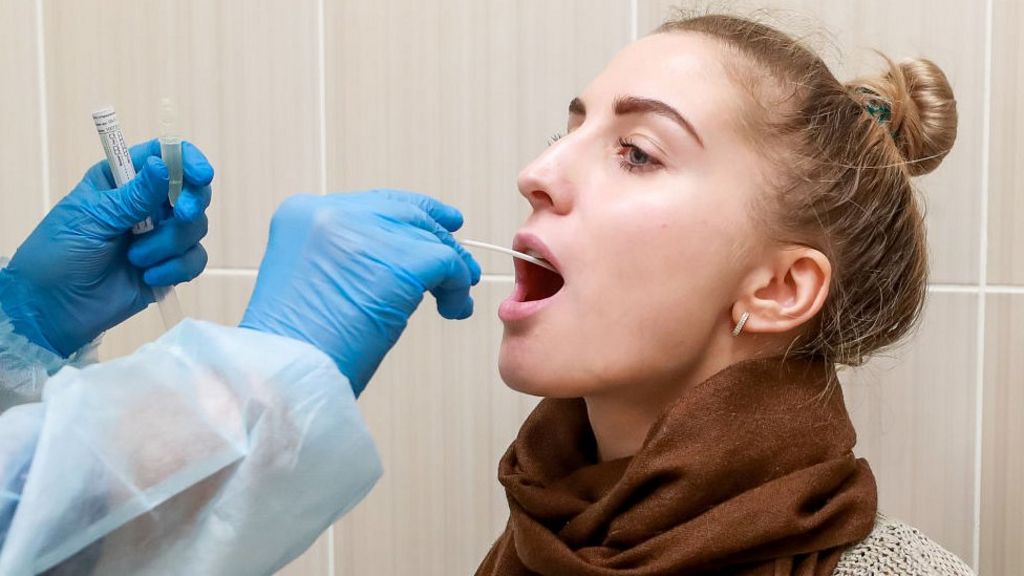
The children’s commissioner for England, Anne Longfield, has also called for weekly tests for staff and pupils.
However, other scientists have questioned whether regular testing would have much point in areas where infection rates are low. The schools minister Nick Gibb has said the government has no plans for general testing in schools: “The advice that we have is that it’s better to test when people actually show symptoms.”
I know it’s a long way off but those children that have been off school for 6 months yet are due to take exams next summer, I think will have the largest negative impact. Is this is going to be looked at at all? from Lisa
It’s very likely that next year’s students will be impacted by this year's results.
Currently, the assumption is that students will sit exams in 2021.
However, there have been some adaptations made to assessments and content. For example, students will be allowed to drop certain subjects to make it easier for teachers to cover the whole course.
If repeatedly touching a mask can render it ineffectual and more likely to transfer infection, how will this work with school children taking masks on and off during the school day? from June
Schools have been issued guidance on how to ensure face coverings are removed safely.
Pupils are to be instructed by staff not to touch the front of their face covering during use or when removing it.
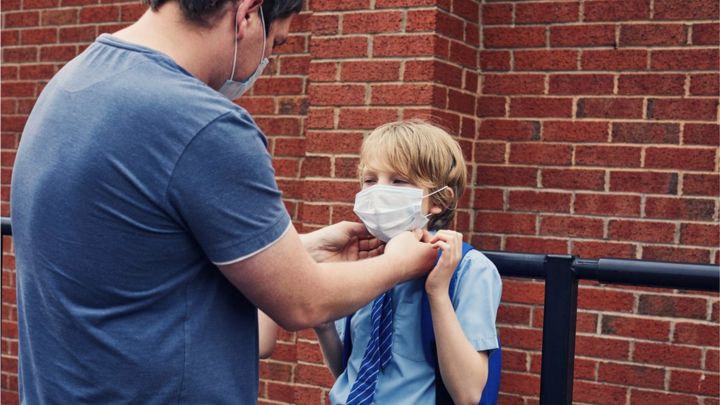
They are also encouraged to wash or sanitise their hands after removing masks.
If pupils have disposable masks, they should put them in a covered bin or if they have reusable masks they should be stored in a plastic bag until they are reused.
All about coronavirus
Your questions
Skip All about coronavirusWhat is the coronavirus? from Caitlin in Leeds Most asked

BBC News Health team
Coronavirus is an infectious disease discovered in China in December 2019. Its more precise name is Covid-19.
There are actually hundreds of coronaviruses - most of which circulate among animals, including pigs, camels, bats and cats. But there are a few - such as Covid-19 - that infect humans.
Some coronaviruses cause mild to moderate illnesses, such as the common cold. Covid-19 is among those that can lead to more serious illnesses such as pneumonia.
Most infected people will have only mild symptoms - perhaps a fever, aching limbs a cough, and loss of taste or smell - and will recover without special treatment.
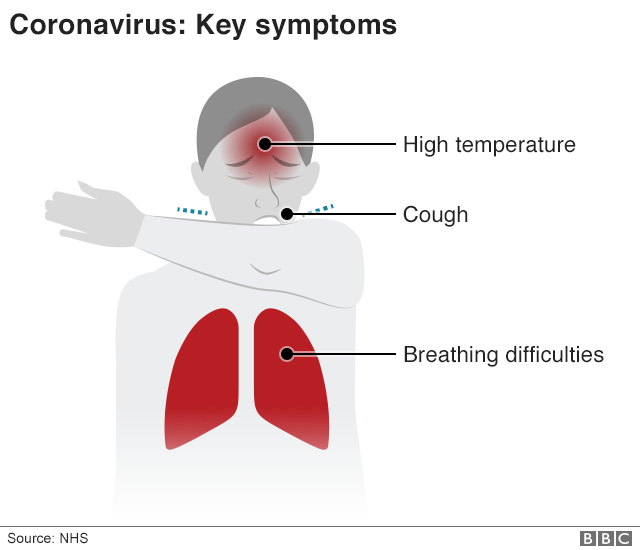
But some older people, and those with underlying medical problems such as heart disease, diabetes, or cancer are at greater risk of becoming seriously unwell.
The NHS has more about symptoms.
Once you've had coronavirus will you then be immune? from Denise Mitchell in Bicester Most asked

BBC News Health team
When people recover from an infection, their body is left with some memory of how to fight it should they encounter it again. This immunity is not always long-lasting or totally efficient, however, and can decrease over time.
It is unclear, though, if people who have recovered from coronavirus will be able to get it again.
Hong Kong scientists have reported the first case of a man who was reinfected with coronavirus, although the World Health Organization has warned against jumping to conclusions on the basis of one case.
University of Oxford’s Prof Sarah Gilbert, who is working on creating a vaccine for Covid-19, says that it “probably is likely” that an infected person will be able to be reinfected in the future.
What is the incubation period for the coronavirus? from Gillian Gibs

Michelle Roberts Health online editor
Scientists have said that the “incubation period” - the time between catching the virus and starting to show symptoms - is five days on average. However, some people can have symptoms earlier or much later than this.
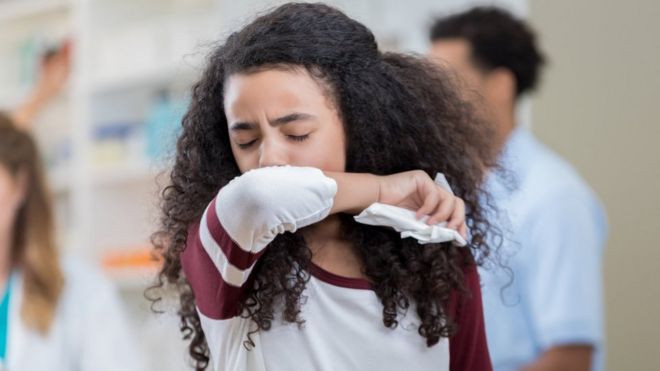
The World Health Organization advises that the incubation period can last up to 14 days. But some researchers say it may be up to 24 days.
Knowing and understanding the incubation period is very important. It allows doctors and health authorities to introduce more effective ways to control the spread of the virus.
Is coronavirus more infectious than flu? from Merry Fitzpatrick in Sydney

Michelle Roberts Health online editor
Both viruses are highly contagious.
On average, it's thought people with the coronavirus infect two to three other people, while those with flu pass it on to about one other person.
There are simple steps you can take to stop the spread of flu and coronavirus:
Wash your hands often with soap and waterIf you have returned from holiday abroad and have to self-isolate in quarantine, you will not automatically qualify for Statutory Sick Pay (SSP), so it's possible you might have to make arrangements with your employer if you cannot work from home.
Catch coughs and sneezes in a tissue and then put it in the binHow long can you be ill? from Nita in Maidstone

BBC News Health team
For four out of five people Covid-19 will be a mild disease, a bit like flu.
Symptoms include [fever, a dry cough or loss of smell and taste(https://www.bbc.co.uk/news/health-51048366)
If the virus gets well established in the lungs it can cause breathing difficulties and pneumonia. About one in seven people may need hospital treatment.
Recovery time will depend on how sick you became in the first place. Some people shrug off the illness quickly, but for others the path to full health can take months, and leave lasting problems.
Asymptomatic people are regarded as "silent spreaders" - what proportion of the population are they estimated to be and how do you find them? From Val Holland in Worcester
This is the subject of ongoing research, but little is still known about how many people are carrying the virus without knowing it.
Different studies currently suggest a huge range of possibilities for how many "silent spreaders" there are - ranging from 5% to 80% of cases. That was the conclusion of an analysis by Prof Carl Heneghan of the University of Oxford and colleagues who looked at 21 research projects.
The upshot, they said, was that "there is not a single reliable study to determine the number of asymptomatics". And they said that if the screening for Covid-19 is only carried out on people with symptoms - which has been the main focus of UK testing policy - then cases will be missed, "perhaps a lot of cases".
Some scientists believe that asymptomatic cases may be the main force driving the pandemic, and there have been calls for increased testing to establish how many "silent carriers" there may be.
Why are diabetics not included in the clinically extremely vulnerable patients, and will the list be refreshed? from Derek Roberts in Hornchurch, Essex

Michelle Roberts Health online editor
Diabetics are not included in the list of people at highest risk. However, some may be advised to take extra precautions if they suffer from a combination of factors, such as heart disease or obesity, as well as diabetes - which put them at much higher risk of complications.
A third of virus deaths in England from 1 March to 11 May were linked to diabetes, but research suggests the threat for those under 40 with type 1 (insulin-dependent) or type 2 diabetes is still very low.
Age remains the strongest risk factor for becoming severely or fatally ill with coronavirus, say experts.
Diabetes UK advises anyone with diabetes to try their best to manage their condition carefully, keeping their blood sugar in range as much as possible, as well as following social distancing measures.
How dangerous is coronavirus for people with asthma? from Lesley-Anne in Falkirk

Michelle Roberts Health online editor
Asthma UK's advice is to keep taking your daily preventer inhaler (usually brown) as prescribed. This will help cut the risk of an asthma attack being triggered by any respiratory virus, including coronavirus.
Carry your blue reliever inhaler with you every day, in case you feel your asthma symptoms flaring up. If your asthma is getting worse and there is a risk you might have coronavirus, contact the online NHS 111 coronavirus service.
Are otherwise healthy disabled people more at risk from coronavirus? from Abigail Ireland in Stockport

BBC News Health team
Coronavirus can be more severe in older people and those with pre-existing conditions such as heart and lung illnesses, or diabetes.
There is no evidence that disabled people who are otherwise healthy - and who don't, for instance, have respiratory problems - are at greater risk from coronavirus.
Will people who've have had pneumonia experience milder coronavirus symptoms? from Marje in Montreal

BBC News Health team
Covid-19 can, in a small number of cases, lead to pneumonia, most notably in people with pre-existing lung conditions.
But as this is a new virus, no-one will have any immunity to it, whether they have previously had pneumonia, or any other form of coronavirus such as Sars.
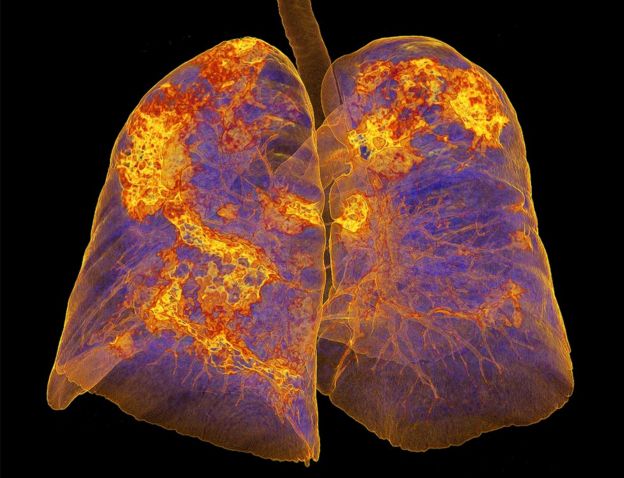
With key workers wearing some sort of mask, how are deaf people who lip-read supposed to understand what is being said? From Margaret Roll in Clevedon
Wearing masks presents major challenges for some deaf people who rely on lip-reading to communicate, but who also need to stay safe from catching the virus, especially if in a hospital setting.
The charity Action on Hearing Loss says there are some clinically approved see-through covered face masks that help enable lip-reading. However, they do not provide enough protection against aerosols spread by coronavirus, and wouldn’t be right for health and social care workers to use during this pandemic.
They say it might be worth using a small whiteboard to communicate. There are also some subtitling or captioning apps that may provide some help.
Vaccines and treatment
Your questions
Skip Vaccines and treatmentWould a vaccine be 100% safe - I am worried that a vaccine may be rushed out and there may be unwanted side-effects? From Tim Pryke in Leeds

Michelle Roberts Health online editor
New vaccines undergo rigorous safety checks before they can be recommended for widespread use. Although research into a coronavirus vaccine is happening at a very rapid pace, these checks are still happening in clinical trials.
Any treatment can have some side-effects and vaccines are no different. The most common side-effects of vaccines are typically mild and can include swelling or redness to the skin where the jab was given.
Will people who have had transplants be able to take the vaccine? from Anne Lindo in Reading

Michelle Roberts Health online editor
Scientists are testing lots of different potential coronavirus vaccines. It is not yet clear which ones may be most effective, if any. Different versions may be more suitable for some people than others.
Tests are happening in volunteers but it will take time to get results and to know who might benefit from vaccination.
If you have received a transplant and are taking immuno-suppressant drugs to prevent rejection, some vaccines, such as "live" vaccines containing weakened bacteria or viruses, may not be appropriate for you.
Would this vaccine still be effective if the virus mutates? From Alan Ng in Dingley, Canada

Michelle Roberts Health online editor
The coronavirus vaccines being developed at the moment are based on the viral strain currently circulating.
Viruses can mutate, but this will not necessarily make the corresponding vaccine less effective. It depends how significant the mutations are and whether they affect the part of the virus the vaccines are designed to safely mimic.
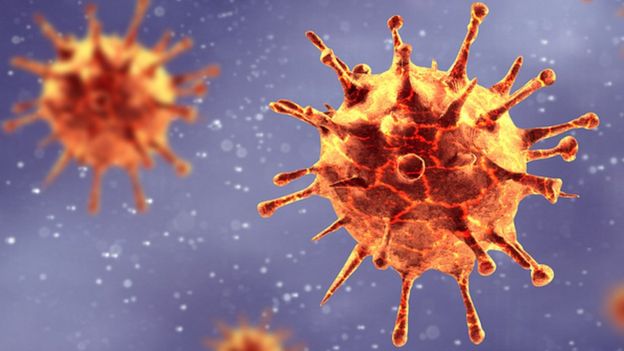
Many of the experimental coronavirus jabs currently being tested contain the genetic instructions for the surface spike protein that coronavirus uses to attach to and infect human cells. Reassuringly, scientists have not seen any substantial mutations to this part of the virus yet that would render these vaccines useless.
Protecting myself and others
Your questions
Skip Protecting myself and othersWhat should I do if someone I live with is self-isolating? from Graham Wright in London

BBC News Health team
If you’re living with someone who’s self-isolating, you should keep all contact to a minimum and, if possible, not be in the same room together.
The person self-isolating should stay in a well-ventilated room with a window that can be opened, and keep away from other people in the house.
If you live with someone who has symptoms, you'll also need to self-isolate for 14 days from the day their symptoms started - this is how long it can take for symptoms to appear.
If you get symptoms, self-isolate for 10 days from when your symptoms start, even if it means you're self-isolating for longer than 14 days. If you do not get symptoms, you can stop self-isolating after 14 days.
Should people stop having sex? from Martha Menschel in Las Vegas
If you live with your partner, they count as being part of your household. If neither of you is showing coronavirus symptoms and you are already in close contact, having sex won't increase the likelihood of you catching the virus from one another. If one person does have symptoms, they should be self-isolating in a separate room.
Using contraception such as condoms won't alter your risk of catching the virus, as having sex will bring you into close physical contact anyway.
"If you are going to touch each other's genitals it's likely that you will potentially be kissing at the same time - and we know the virus is passed through saliva," Dr Alex George told the BBC's Newsbeat.
"Essentially, any possibility of transfer of coronavirus - from your mouth to your hands, to genitals, to someone else's nose or mouth - increases the risk of passing on coronavirus."
Me and my family
Your questions
Skip Me and my familyI am five months pregnant and want to understand the risk to the baby if I get infected? from a BBC website reader

James Gallagher Health correspondent
Pregnant women are being advised by the UK government to stay at home and keep contact with others to a minimum. However, they should attend antenatal clinics as normal.
There is no evidence to suggest that pregnant women are more likely to get coronavirus. But, for a small number of women, being pregnant may change the way their body deals with a severe viral infection.
The government’s chief medical adviser says this is a precautionary measure until scientists find out more about the virus and that "infections and pregnancy are not a good combination in general”.
I am breastfeeding my five-month-old baby - what should I do if I get coronavirus? from Maeve McGoldrick

James Gallagher Health correspondent
Mothers pass on protection from infection to their babies through their breast milk.
If your body is producing antibodies to fight the infection, these would be passed on through breastfeeding.
Breastfeeding mums should follow the same advice as anyone else over reducing risk - cover your mouth when you sneeze and cough, throw away used tissues straight away and wash hands frequently, while trying to avoid touching your eyes, nose or mouth with unwashed hands.
Is it possible to catch coronavirus from a pet dog or cat? from Javed
This is highly unlikely to happen, according to scientists and vets.
While there are rare cases where an animal has caught the virus from a human, there is no evidence that humans can catch the virus from animals.
It is possible that a pet's fur could become contaminated if an infected person has previously touched or stroked the animal.
But even without the threat of coronavirus, you should always wash your hands with soap and water after handling an animal or its lead, and avoid touching your nose and mouth.
What is the risk to children? from Louise in London

BBC News Health team
In general, children appear to be relatively unaffected by coronavirus, according to data from China and other countries.
This may be because they are able to shake off the infection or have no symptoms or only very mild ones similar to a cold.
However, children with underlying lung problems, such as asthma, may have to be more careful.
Work issues
Your questions
Skip Work issuesI'm self-employed. Can I claim benefits if I can't work due to the virus? from Mark Gribby in Nottingham

Simon Gompertz Personal finance correspondent
Self-employed people who have symptoms or have been told to self-isolate may apply for two benefits - universal credit or employment and support allowance.
Normally, you would be eligible after four days of being ill. However, the government has responded to the spread of coronavirus by saying that companies will temporarily pay SSP from the first day off.
But charities are worried that there is still a five-week delay before universal credit is paid.
Who is eligible for universal credit? from Mario in London

Moneybox team BBC Radio 4
Anyone aged 18 or above can apply for universal credit if they live in the UK and are on a low income or out of work.
Students in full-time education aren’t usually eligible for universal credit, but they can make a claim if they do not have any parental support, are responsible for a child or are in a couple with a partner who is eligible for universal credit.
People aged 16 or 17 can also apply for universal credit if they do not have any parental support, are responsible for a child, caring for a disabled person or cannot work.
You can use the government's benefits calculator to find out how much you may be entitled to.
If you have to self-isolate will you only get statutory sick pay, or will your employer pay your salary? from Laura White in Herefordshire
The government advises that people who are self-isolating should work from home wherever possible and be paid as normal.
If they can’t work from home, employers must ensure any self-isolating employee gets sick pay or is allowed to use paid leave days if they prefer.
Employees in self-isolation are entitled to Statutory Sick Pay for every day they are in isolation, worth £95.85 per week, as long as they qualify.
However, employers can choose to pay staff their full wages during this period if they wish.
What are my chances of getting a job in lockdown/when lockdown is over? from Jess in Essex

Moneybox team BBC Radio 4
Research conducted by the Resolution Foundation has found that the coronavirus pandemic could increase youth unemployment by 600,000 this year.
If you’re worried about finding a job you can head to the National Careers Service for advice on how to find job vacancies.
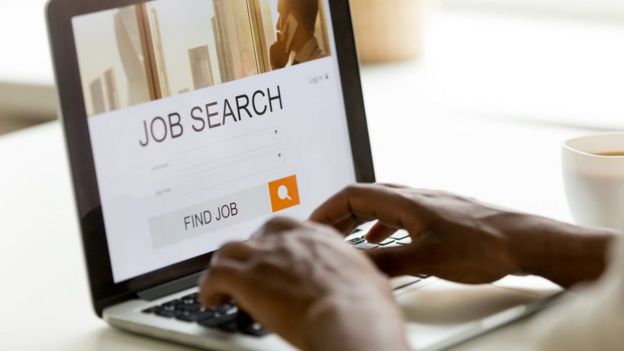
You can also search online for virtual job fairs. This could help you explore different job opportunities and connect with potential employers directly from home.
Experts recommend using lockdown to refresh your CV and also look for any online training opportunities which might put you in a better position when you eventually apply for a job.
Testing, tracking and tracing
Your questions
Skip Testing, tracking and tracingHow will people who don't have a mobile phone be able to submit that they have symptoms? From Lorna Miller in Liverpool
People experiencing symptoms will be asked to report this as soon as possible and order a test.
You can either do this via the NHS website or if you do not have access to the internet you can dial 119 in England, Wales and Northern Ireland or 0800 028 2816 in Scotland.
If you have been exposed to someone who has tested positive you may be contacted by text message, email or phone.
The government did have plans for a tracing app which would work on a smartphone, but these have been put back until winter at the earliest.
Quarantine
Your questions
Skip QuarantineCan I travel to Ireland and then onto another country, then back to the UK via Ireland to avoid the quarantine? from Chris McCann in Sandhurst
The short answer to this is no.
It's true that you don’t have to go into quarantine if you’re returning to the UK from what’s known as the Common Travel Area (CTA) - Ireland, Isle of Man and the Channel Islands.
When the government first announced its plans, there was some speculation that to avoid quarantine, travellers from other countries would be able to fly into an airport in the CTA, and then on to the UK and so avoid having to self-isolate.
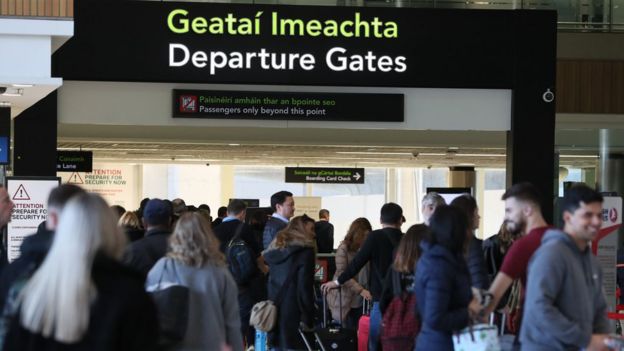
However, this loophole (termed by some the "Dublin dodge") has now been closed by the government. Travellers will only be exempt from quarantine if they have been in the CTA for 14 days or more.
You will have to show proof of when you entered the CTA, and how long you have spent there - such as a boarding pass or itinerary - when you enter the UK.
Do key workers have to quarantine? From Mateusz in London
Key workers will not necessarily be exempt.
The government has published a detailed list of who will not need to follow the quarantine rules. Among others, it includes road haulage and freight workers, medical and care professionals providing essential health care, some seasonal agricultural workers, Eurostar and Eurotunnel employees, pilots and aircrew and people working to maintain key infrastructure such as the railways.
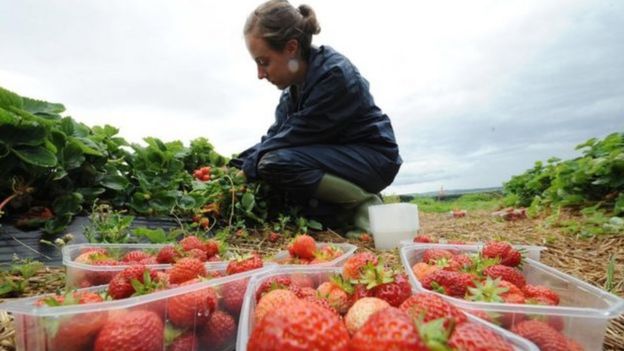
It also depends where you are going in the UK - some employees will be exempt from quarantine in England and Wales, but not Scotland.
The government guidance details what you’ll need to show when you enter the UK to prove you are exempt. This differs between categories but typically includes proof of your name and address, the name of your employer and what work you’ll be doing.
Will my flatmates have to quarantine as well because of me? From Matteo in London
Unless your flatmates were travelling with you, they do not need to self-isolate or quarantine with you.
However, you must avoid contact with them and minimise the time you spend in shared spaces like kitchens, bathrooms and sitting areas.
You should stay in a well-ventilated room with a window to the outside that can be opened, separate from your flatmates, and if you can, you should use a separate bathroom from them. If you do need to share these facilities, regular cleaning will be required after each person has used them.
Make sure you use separate towels from the other people in your house, both for bathing and showering, and for washing your hands.
If I have to quarantine after a holiday and can’t work from home will I get paid? From Emma in Portishead, Bristol
Not necessarily.
If you have returned from holiday abroad and have to self-isolate in quarantine, you will not automatically qualify for Statutory Sick Pay (SSP), so it's possible you might have to take the extra time off as annual leave, or else as unpaid leave.
The Department of Work and Pensions says that anyone planning to travel should do so in the knowledge that they will be required to self-isolate on their return.
It adds that employers and staff should discuss and agree any arrangements in advance, and urges employers to take socially responsible decisions.
Meanwhile, the Foreign & Commonwealth Office is still advising UK nationals against taking all but essential international travel.
Support bubbles
Your questions
Skip Support bubblesWhen will people be allowed to resume physical contact with a loved one in a bubble scenario? from Sue in Chester
If you and your boyfriend both live alone and in England, you can form a support bubble, which means that you can spend as much as time as you want in each other’s company, inside or outside a house. You don’t have to keep a 2m distance from one another, and you can stay overnight at each other’s house.
If you are living alone, and your partner is in a shared household (or vice versa), matters get complicated. You can still form a support bubble with your boyfriend but it will also be with his household, and it would be the only bubble allowed to that household.
What this means is that if one of your boyfriend’s housemates has a partner who is - like you - living elsewhere and alone, that couple will be prevented from meeting up.
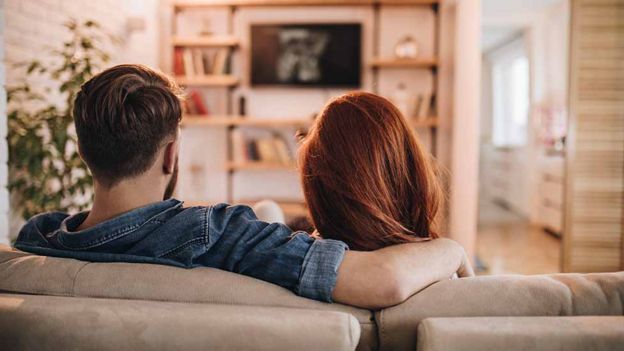
Support bubbles are for the benefit of people who are living alone (or alone with children). If both you and your boyfriend are living in shared households, you are not allowed to form one and you are restricted to meeting outdoors and at a distance of 2m from each other.
Northern Ireland has also introduced support bubbles while Scotland and Wales now allow a similar arrangement known as "extended households". In all of these, if one person taking part develops symptoms, every member of the bubble or extended household must self-isolate.
Can I have my grandson overnight? I am a single grandparent living on the ground floor in my own house, however I have a lodger who lives on the second floor. from Teresa
If you're in England, and you're a single grandparent, you have the right to form a “support bubble” with your grandson and his family.
Under the government’s guidance, your grandson is able to stay at your home, including overnight, and would not need to keep a 2m distance.
However, the complicating factor here is your lodger. Are you maintaining a 2m distance from each other, and are you using separate rooms and facilities? If the answer is yes, then there should be no problem.
On the other hand, if you have been using the same kitchen, living room and bathroom, and eating from the same crockery and cutlery as your lodger, then you are both effectively part of the same household, and you do not qualify to be part of a support bubble.
What do I need to know about the coronavirus?
What questions do you have about coronavirus? Do you want to ask it on BBC News? Get in touch and we may ask you to send us a video of you asking your question.
In some cases, your question will be published, displaying your name, age and location as you provide it, unless you state otherwise. Your contact details will never be published. Please ensure you have read our terms & conditions and privacy policy.
Use this form to ask your question:

 5 years ago
599
5 years ago
599 

